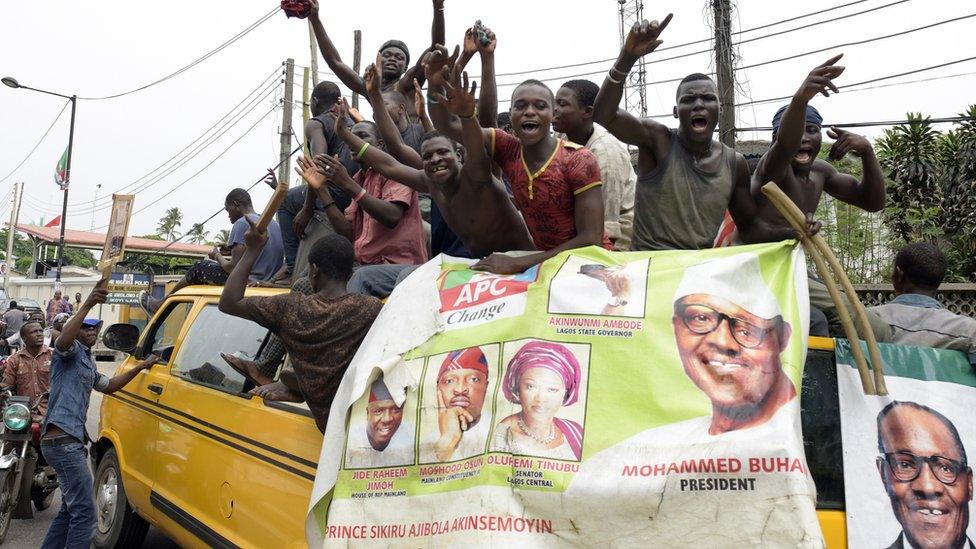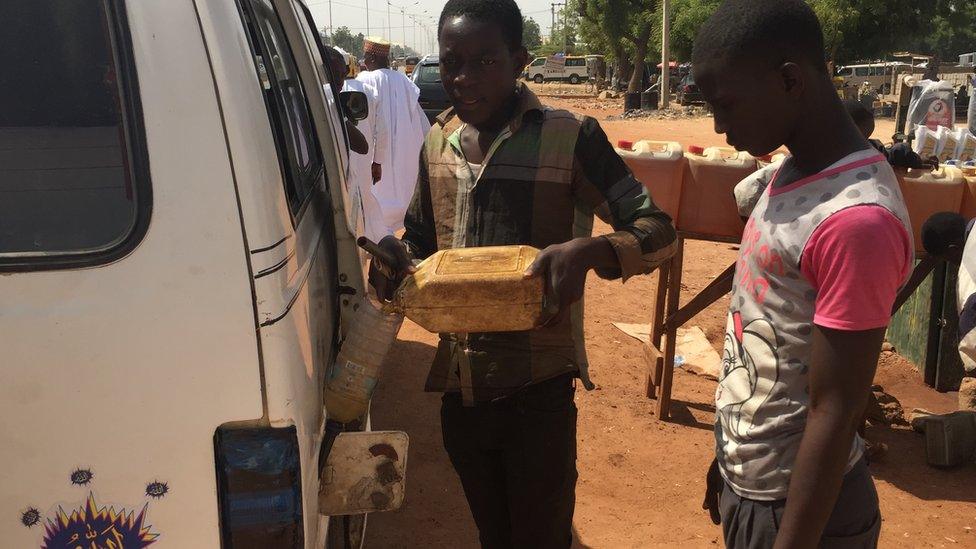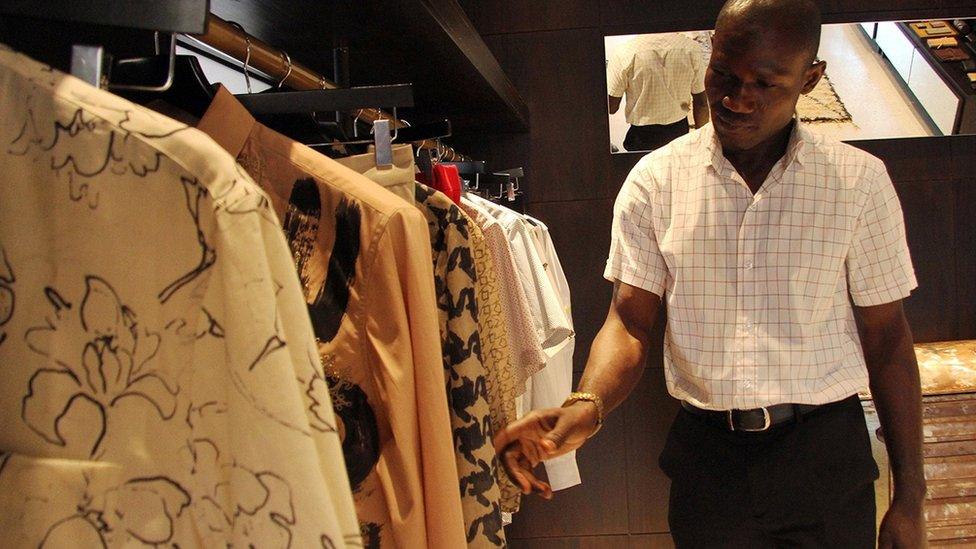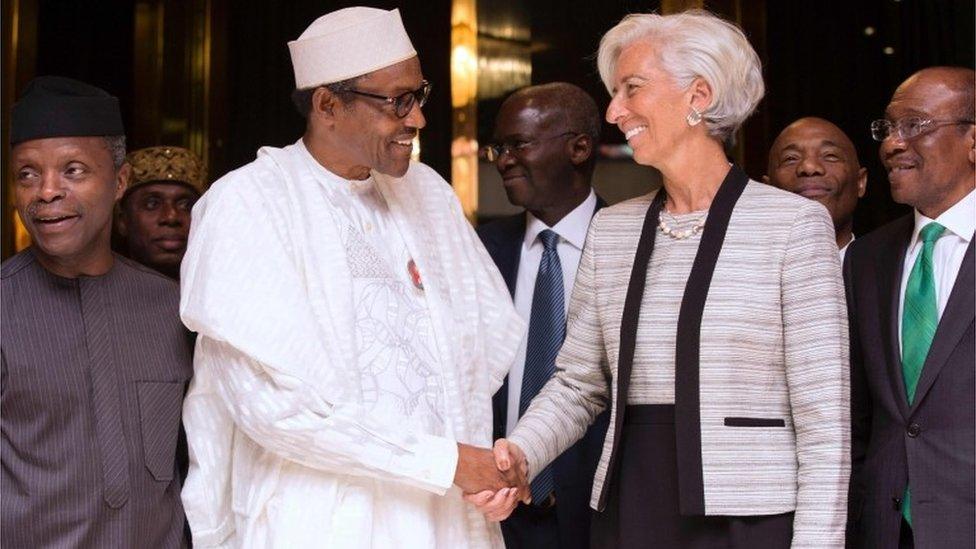Letter from Africa: Little seasonal cheer in Nigeria
- Published

There was a lot of excitement when President Muhammadu Buhari was elected last year
In our series of letters from African journalists, Sola Odunfa ponders what might be a painful 12 months for Nigerians.
Over the last few days, everyone I have met - relative, friend or total stranger - has been offering me the traditional "Happy New Year" greeting.
Of course, we all know that there is nothing happy about our present circumstances and that there is nothing to be happy about in what we are seeing on the horizon.
The dollar-crazy Nigeria, which most of us abused unconscionably for several years, is dead and the new nation in its place has little more to offer than hard, hard work.
There is no sweet talk either from the government of President Muhammadu Buhari to ease the pain.

Sola Odunfa:

"As the economy remains in the doldrums, many Nigerians are asking how the disgrace of former officials will put food on their families' tables "

At every opportunity it reminds us to our face, quite rightly I'd say, that the treasury was looted and the government is broke - and is dealing with an $11bn (£7.4bn) budget deficit.
Police and prison cells are now being filled with former flamboyant politicians and others who are alleged to have stolen public funds on a scale unheard of even in Nigeria's corrupt history.
Despite voting in their millions last year for such justice to be meted out, hardly anyone is cheering the government today.
As the economy remains in the doldrums, many Nigerians are asking how the disgrace of former officials will put food on their families' tables.

Nigeria at glance:
Africa's largest economy and most populous nation
Oil rich, but facing tough economic situation after falling oil prices
62.6% of its 170 million population live in poverty
Average annual earnings - $1280 (£850)
Source: UN

Likewise, the seasonal greeting should ring hollow in Benin, Nigeria's western neighbour - when Nigeria sneezes, it triggers not only coughs but 'flu in Benin.
Most of the illegal goods found in Nigeria's markets are alleged to be smuggled through the port in Cotonou.
So huge was the business that in the past two years the tiny nation of about 10 million people imported more rice and frozen chicken than China and the UK.
Of course, practically all of it was smuggled into Nigeria. Now that Nigeria's government is taking action to seal that criminal route, our Beninois cousins must share our agony.
There is also no end to the petrol woes facing this oil-producing nation.

Correspondents say the fuel subsidy scheme has become an enormous scam
At Christmas I filled my car's tank and bought a little extra to meet the emergency situation that is looming.
The government announced a token reduction in the pump price of petrol, even though the product is in short supply, possibly to ease the financial burden on motorists and other transporters.
And now trade union leaders alerted their state organisers to start mobilising workers for a possible nationwide strike.
Their grouse is that the government says it will no longer subsidise the pump price of petrol - which it says costs about $5bn (£3.5bn) a year.
But it is of no concern to the unions that the government is broke, following years of looting by public office holders.
Well, fuel crises and strikes are no strangers to Nigerians.

The situation also affects many businesses in the country
Fuel queues have petered out in Lagos and Abuja, where motorists are buying at the nominally-reduced official prices.
But New Year has not brought any succour to motorists outside the two cities as fuel, where it's available, continues to sell for up to 50% above the official price.
Christine Lagarde, managing director of the International Monetary Fund, arrived in Abuja on Monday to discuss Nigeria's economic plight with President Buhari, leaders of the National Assembly and business people.
Her speeches were couched in such language as would not cause indigestion to her hosts but they were outspoken enough.

President Muhammadu Buhari held talks with Christine Lagarde this week
She did not tell the government to remove fuel subsidies, she only said that the subsidies were "hard to defend" and they "rarely help the poor".
She did not say the economy was in the doldrums but that there was a "massive infrastructure deficit and high levels of poverty and inequality".
She had a word too for the country's neighbours: "Nigeria has a large regional footprint and its fortunes affect that of its neighbours." He who has ears let them hear what the spirit is saying!
After all this should I still say "Happy New Year"?
Oh yes, I will because I know that whatever the horizon portends, Nigerians are survivors. Raise the palm wine calabash and toast: Happy New Year!

More from Sola Odunfa:
